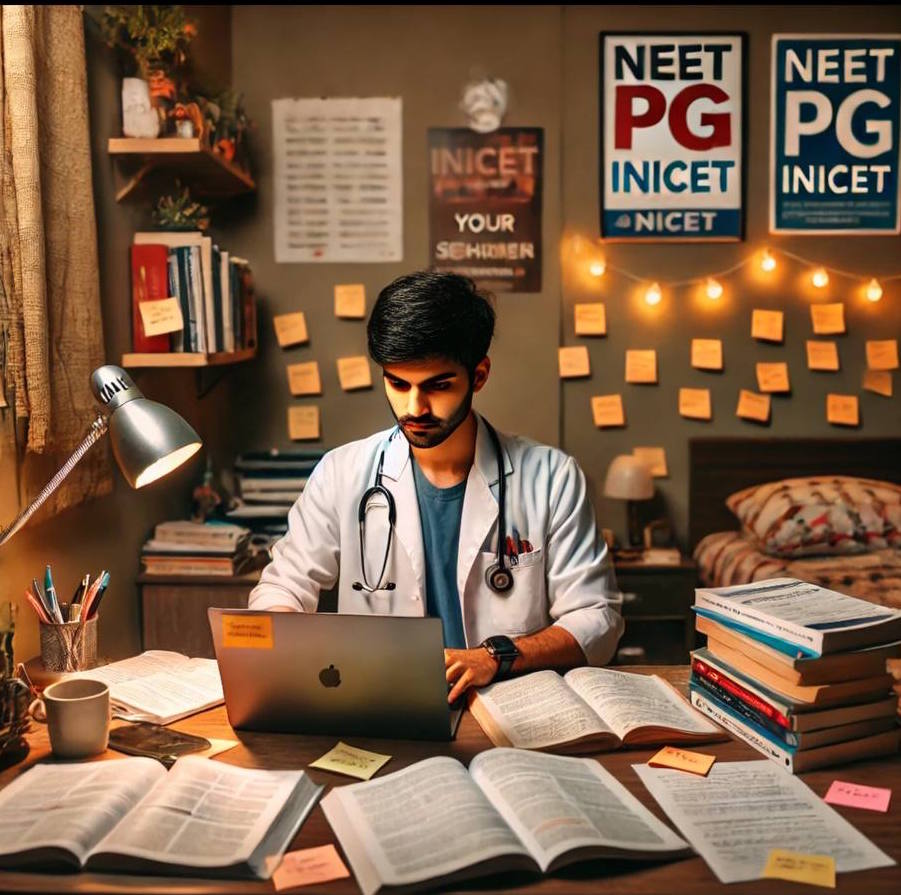
It was a particularly sultry May afternoon, the kind that makes you question every life decision. The sun was flaunting its unrelenting glory, and the clouds had seemingly taken a vacation. I sat at my study table, staring blankly out the window, a cocktail of emotions brewing inside—Did I pick the right resources? Should I have gone for engineering instead? Why are my GT scores frozen in time?
The existential crisis was real, but the journey wasn’t over.
Now, with the clarity of hindsight (and a couple of good results to boast about), I look back at those moments of despair and wish to help anyone walking the same uphill path.
Here are the 7 resources that helped me secure an AIR 982 in NEET PG and AIR 192 in November INICET 2024 with a dollop of practical advice.
1. Main Notes from DAMS
DAMS notes became my trusted companion. I joined during undergrad and had most of my notes ready before internship. They’re concise, crisp, and revisable—a prep warrior’s trifecta.
Here’s the golden rule: Don’t just take notes—revise them. They should be the love of your life for the next few months. Revisit them, argue with them, come back to them after you forget but never ignore them.
2. QBank and PYQs from Marrow
This was my MCQ Disneyland. The question bank was exhaustive (although sometimes exhausting), but every question came with detailed explanations and credible references in the end backing the former up.
Further, Marrow also has the most extensive collection of previous year questions (PYQs), dating back to 2017 for each of NEET, INICET and FMGE without which rank in any of the three, slips drastically. Solving these over and over wasn’t just practice; it was therapy for my stressed-out brain (albeit the cause of stress in many occasions too.)
3. Grand Tests (GT) and Analysis
GTs are like your brutally honest bestfriend. They tell you where you stand, even if you don’t like the answer.
I took weekly GTs from mid-internship to the last November INICET 2024 and subsequently, analyzed 50 of the 200 questions daily. Were my scores always great? Nope. But GTs taught me endurance, time management, and how to survive 3.5 hours in an exam hall without losing my mind (mostly).
Remember: GT scores ≠ final rank. Think of them as your diagnostic tests, not your destiny.
4. Tests and Discussions from DAMS
Mock tests and the discussions afterward were a revelation. The faculty didn’t just give answers—they dissected my mistakes, showing me where my thought process had derailed and what I can do to curtail this in the real exam.
These sessions taught me how to think like an examiner, spot trappers, and rule out wrong answers systematically. Bonus: They made me realize I wasn’t the only one overthinking every question!
5. Smart Revision with BTR and DVT
While taking an exam, did it ever feel as if you would zero down on the right answer only if the book was available in front of you and then you would jump right in at the exact page? This is inadequate revision manifested. Happened with me many times more than I could be proud of.
Revision isn’t just important—it’s your whole strategy. As exams approached, I leaned heavily on BTR by Dr. Zainab Vora Ma’am and DVT by DAMS.
Although there are extensive debates regarding which short-term revision course is better, as a rule of thumb:
• BTR: Perfect for pre- and para-clinical subjects.
• DVT: A lifesaver for final-year topics.
Now, these resources are high-yield but meant only for revision, not first-time study. Remember, shortcuts are great for traffic, not exams.
6. Free YouTube Resources
When the grind felt overwhelming, YouTube came to the rescue.
Dr. Deepak Marwah sir’s rapid revision videos and Dr. Ashwani Kumar sir’s cadaver dissection sessions were like Netflix for nerds—entertaining and educational. Bonus: Free content without any paywall drama.
Further, Dr. Aditya Gupta sir and Dr. Rishabh Jain sir’s YouTube channels provided me with strategies that enabled me to get an extra edge.
7. Simulating the Real Exam: CBT
Studying at home is one thing. Taking an exam in a noisy hall with creaky chairs and a rebellious computer? That’s a different beast altogether.
CBTs (by DAMS & DBMCI) helped me prep for these curveballs. During NEET, when my system crashed mid-exam, I didn’t panic. Why? Because it had already happened to me in a CBT.
Longer the time you spend in simulation, lower the chances would be of you encountering surprises in the real exam.
Closing Thoughts
Cracking NEET PG and INICET is definitely not about superhuman intelligence—it’s about consistent effort, smart strategies, and choosing resources that work for you.
You cannot control the results, but you can control the process. So trust it, stay determined, and remember: even on the worst days, you’re still one step closer to your goal.
All the best!